Understanding other cultures and the range of challenges people from all societies face is brought to the classroom by individuals who grew up in other countries, often under conditions of severe duress. Before visitors arrive, students are required to research aspects of the other country’s culture and have specific questions and concerns they wish to address.
 Abdullah Alsultan (right) compares and contrasts histories, cultures, and religions of his native Saudi Arabia with those of the U.S., helping to break down stereotypes, improve understanding, and build mutual respect.
Abdullah Alsultan (right) compares and contrasts histories, cultures, and religions of his native Saudi Arabia with those of the U.S., helping to break down stereotypes, improve understanding, and build mutual respect.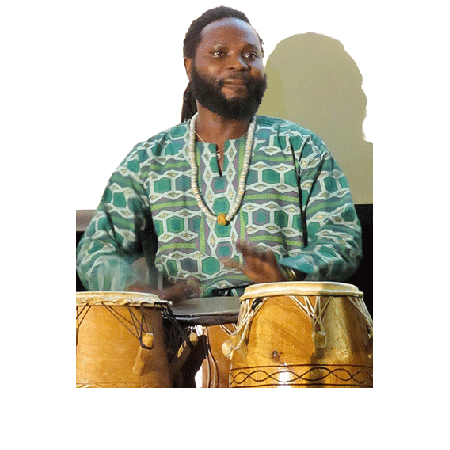 Theo Martey, who grew up in Accra, Ghana, is the founder and director of the Akwaaba Ensemble. An internationally acclaimed musician, Theo and his group immerse students in African songs, rhythms, cultures and dance, then perform together for classmates and parents.
Theo Martey, who grew up in Accra, Ghana, is the founder and director of the Akwaaba Ensemble. An internationally acclaimed musician, Theo and his group immerse students in African songs, rhythms, cultures and dance, then perform together for classmates and parents. High school (now college) student Nga Ruckdeschel (right) implemented several Words Into Deeds projects and twice participated in U.N. Student Leadership Conferences. Here she is with Ayuen Ajok, a “Lost Boy of Sudan,” working on the annual “Walk for Water” campaign.
High school (now college) student Nga Ruckdeschel (right) implemented several Words Into Deeds projects and twice participated in U.N. Student Leadership Conferences. Here she is with Ayuen Ajok, a “Lost Boy of Sudan,” working on the annual “Walk for Water” campaign. Ayuen Ajok helps students understand the critical needs for access to clean water in many developing countries. In support of the U.N. Sustainable Developmenet Goal of access to clean water, students raised over $12,000 to instal a well close to a school in Juba, South Sudan.
Ayuen Ajok helps students understand the critical needs for access to clean water in many developing countries. In support of the U.N. Sustainable Developmenet Goal of access to clean water, students raised over $12,000 to instal a well close to a school in Juba, South Sudan. Chief Joseph Ole Topinko and his wife Cicilia shared stories and answered questions about life as a Masai in Kenya, Africa, where drought has impacted all aspects of village life. $5,550 was raised for the Masai Good Salvage Outreach Fund.
Chief Joseph Ole Topinko and his wife Cicilia shared stories and answered questions about life as a Masai in Kenya, Africa, where drought has impacted all aspects of village life. $5,550 was raised for the Masai Good Salvage Outreach Fund.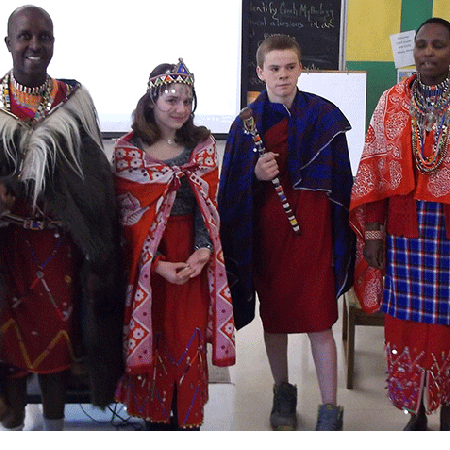 Led by Chief Joseph Ole Topinko and his wife Cicilia, students learn Masai cultural norms by re-enacting a traditional wedding ceremony.
Led by Chief Joseph Ole Topinko and his wife Cicilia, students learn Masai cultural norms by re-enacting a traditional wedding ceremony. Denis Okema (3rd row, 2nd from left), recruited as a child soldier at age 9 in Uganda, shares experiences of captivity and escape. He discusses the impact of conflict on the social fiber of developing countries, and strategies for reconciliation, peace and sustainability.
Denis Okema (3rd row, 2nd from left), recruited as a child soldier at age 9 in Uganda, shares experiences of captivity and escape. He discusses the impact of conflict on the social fiber of developing countries, and strategies for reconciliation, peace and sustainability.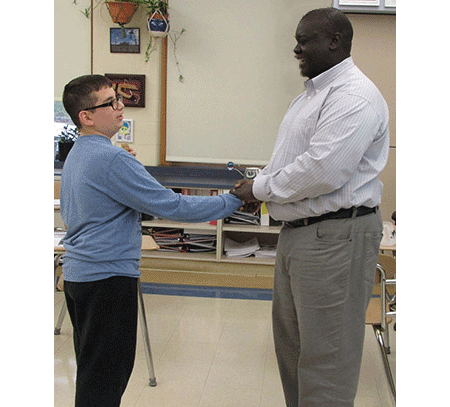 Denis Okema receives thanks after leading a classroom discussion about reconciliation as a strategy to resolve conflict.
Denis Okema receives thanks after leading a classroom discussion about reconciliation as a strategy to resolve conflict. A certified guide and educator, Fernando provides eco-educational tours throughout Ecuadorian rain forest and agricultural environments. In the classroom he leads students in discussions on the vital role of rainforests in global sustainability, and factors affecting the human rights of indigenous peoples.
A certified guide and educator, Fernando provides eco-educational tours throughout Ecuadorian rain forest and agricultural environments. In the classroom he leads students in discussions on the vital role of rainforests in global sustainability, and factors affecting the human rights of indigenous peoples.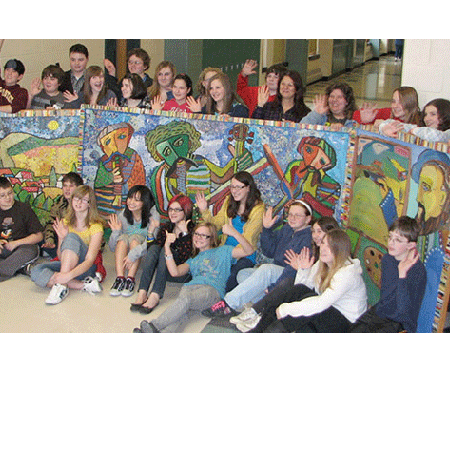 Katilin Papp (black in the black blouse behind the painting), a Slovakian Roma artist, brings Slovakian childrens’ artwork to introduce the ongoing prejudice and hostility faced by Roma people, and as a means of identifying and breaking down stereotypes. This project was co-organized with Breana Copp (rear, left).
Katilin Papp (black in the black blouse behind the painting), a Slovakian Roma artist, brings Slovakian childrens’ artwork to introduce the ongoing prejudice and hostility faced by Roma people, and as a means of identifying and breaking down stereotypes. This project was co-organized with Breana Copp (rear, left). Working with Kingsley, students founded the "Education Prevents Recruitment" project to support the education of Ogoni Nigerian children. In addition to collecting school supplies, students raised money to help meet the costs of tuition and school uniforms.
Working with Kingsley, students founded the "Education Prevents Recruitment" project to support the education of Ogoni Nigerian children. In addition to collecting school supplies, students raised money to help meet the costs of tuition and school uniforms.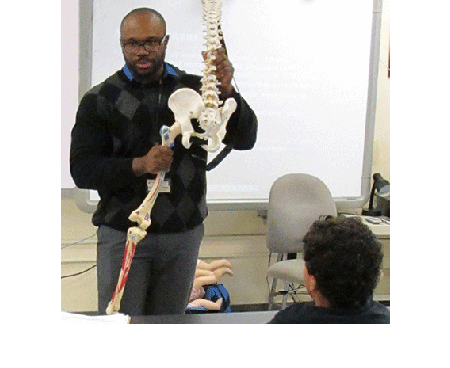 Kingsley Kabari Kingsley grew up amid civil war in Nigeria, and immigrated to the U.S. as a teenager with no formal education or English language skills. Now he is a licensed chiropractor. Here he is discussing wellness and problems associated with substance abuse, poor nutrition, and lack of exercise.
Kingsley Kabari Kingsley grew up amid civil war in Nigeria, and immigrated to the U.S. as a teenager with no formal education or English language skills. Now he is a licensed chiropractor. Here he is discussing wellness and problems associated with substance abuse, poor nutrition, and lack of exercise.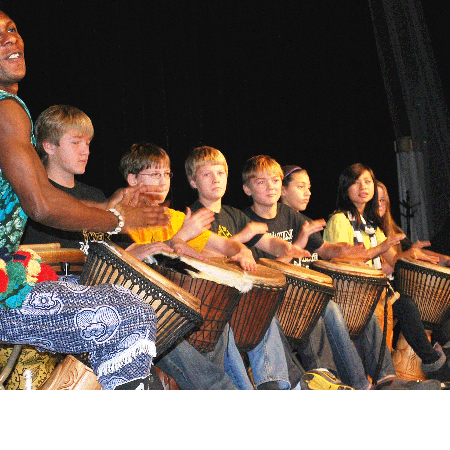 Nana Amin and the Wassa Pan African Drum Ensemble bring West African songs, rhythms and dance to classrooms, helping students learn about and better understand the history and cultural heritage of his native country, Ghana.
Nana Amin and the Wassa Pan African Drum Ensemble bring West African songs, rhythms and dance to classrooms, helping students learn about and better understand the history and cultural heritage of his native country, Ghana. Rebecca Odongkara, founder of the UNIFAT school in Uganda, discussing the effects of conflict and disease on children. With an enrollment of 1300, the school provides educational opportunity for AIDS and war orphans.
Rebecca Odongkara, founder of the UNIFAT school in Uganda, discussing the effects of conflict and disease on children. With an enrollment of 1300, the school provides educational opportunity for AIDS and war orphans.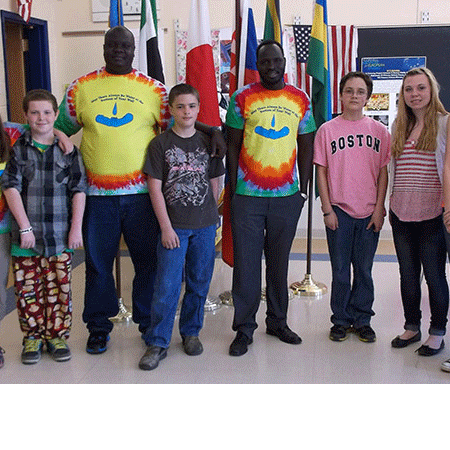 Denis Okema (2nd from left) and Ayuen Ajok (center) work with students to help raise funds to install a clean water well in Juba, South Sudan.
Denis Okema (2nd from left) and Ayuen Ajok (center) work with students to help raise funds to install a clean water well in Juba, South Sudan.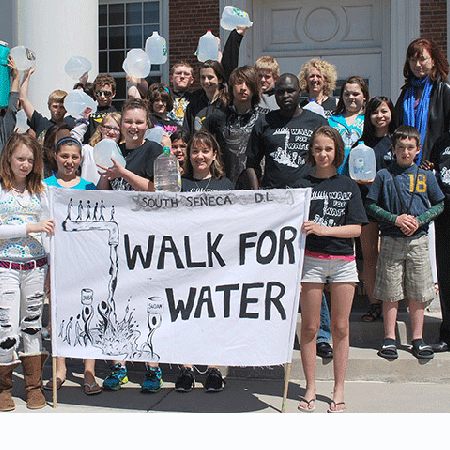 Supporting the Sustainable Development Goals of Clean Water and Quality Education, students Walked for Water to raise awareness of the problems in many countries. Two former “Lost Boys of Sudan” shared their experiences, and over several years students have raised over $12,000 to support installing a well close to a school in Juba, South Sudan.
Supporting the Sustainable Development Goals of Clean Water and Quality Education, students Walked for Water to raise awareness of the problems in many countries. Two former “Lost Boys of Sudan” shared their experiences, and over several years students have raised over $12,000 to support installing a well close to a school in Juba, South Sudan. Daniel Tirira (right), a certified Ecuadorian guide, translates as Wilson Andi, a native Quichuan, demonstrates how palm leaves can be woven to make thatched roofs.
Daniel Tirira (right), a certified Ecuadorian guide, translates as Wilson Andi, a native Quichuan, demonstrates how palm leaves can be woven to make thatched roofs.
